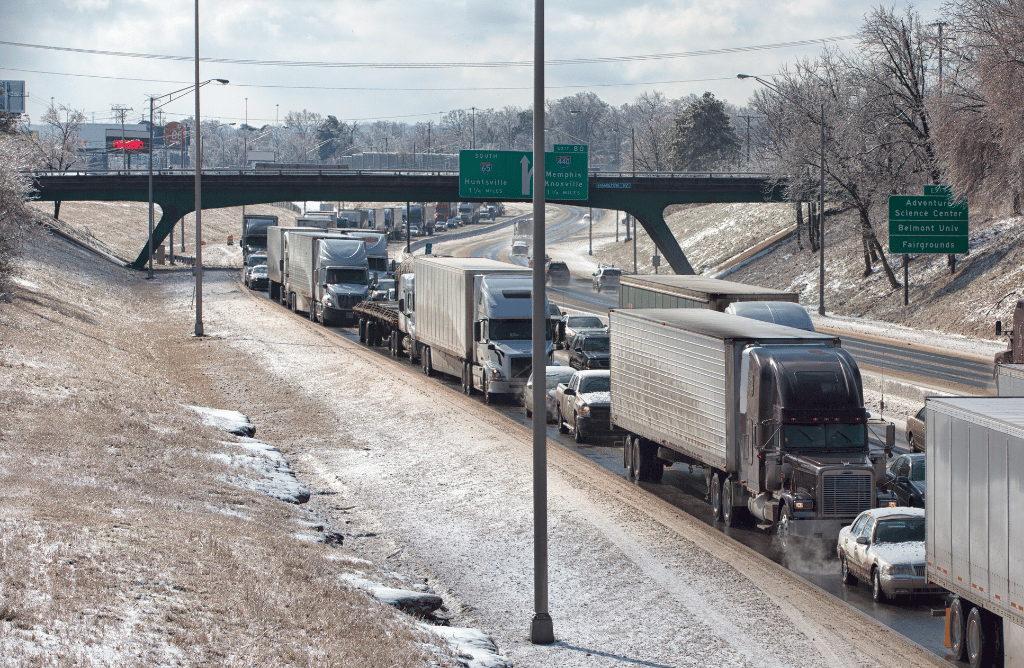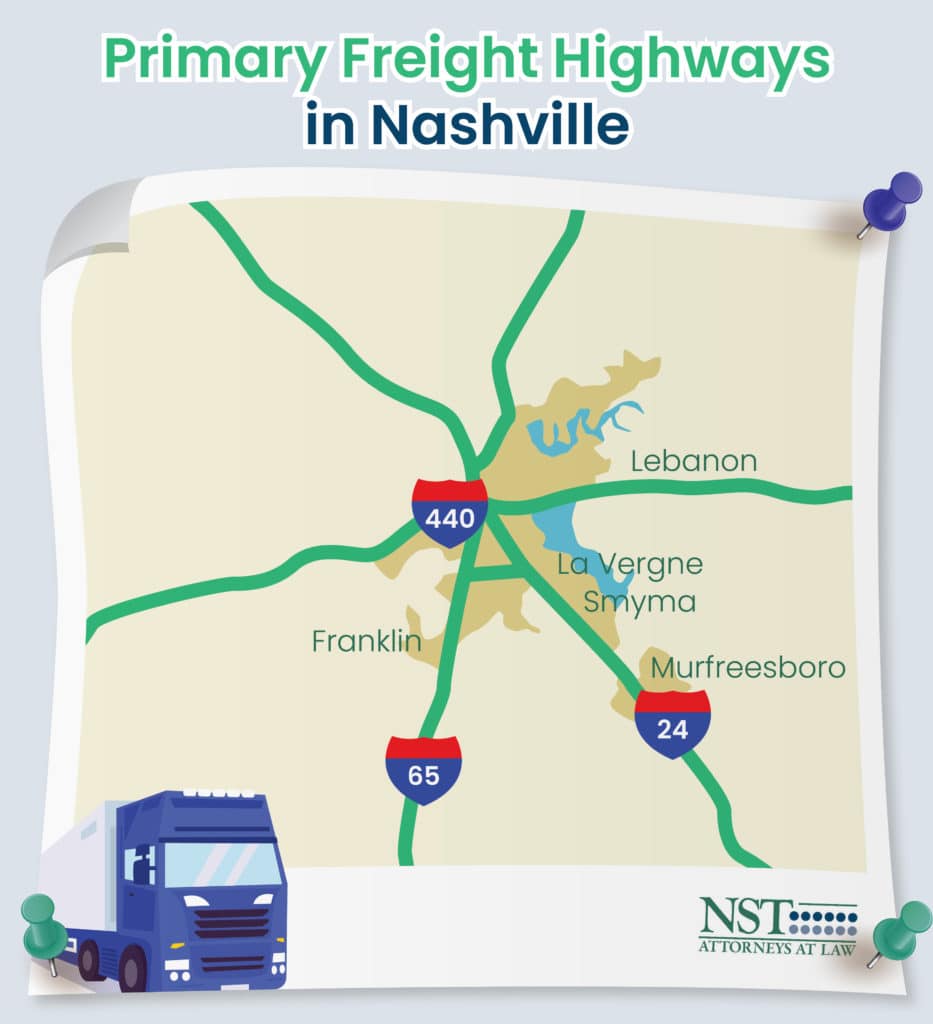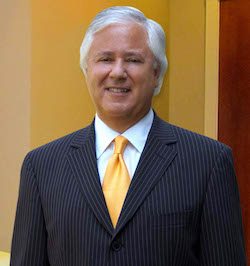
Nashville
Truck Accident Lawyers




If you were injured in a truck accident in Nashville, you might be experiencing pain from your injuries, a loss of income due to days out from work, and emotional distress.
Truck accidents are among the most dangerous collisions due to the size and weight of the vehicles involved. Trucks may weigh up to 80,000 pounds when fully loaded. In comparison, a car may be only 4,500 pounds.
At any speed, a truck can cause serious damage and potential injuries in an accident.
If you’ve been injured in a truck accident, contact our Nashville personal injury lawyers to schedule a free consultation.
Table Of Contents
- Why should I hire NST Law to handle my truck accident case?
- How long do I have to file a truck accident lawsuit in Nashville?
- How much is my case worth after a Nashville truck accident?
- What type of truck accidents in Nashville can NST help with?
- How dangerous are Nashville truck accidents?
- Common roadways and intersections in Nashville for serious injury and fatal truck accidents
- Tennessee truck driver laws
- What if my family member was killed in a Nashville truck accident?
- Frequently Asked Questions (FAQs)
Why should I hire NST Law to handle my truck accident case?
Hiring an experienced and knowledgeable attorney is often the best thing you can do after experiencing injuries as the result of a truck accident. Schedule a free consultation with us at our Nashville law office to review the facts of your case.
Our skilled team will work with you to understand the extent of your injuries and help you recover any damages that you are entitled to.
How long do I have to file a truck accident lawsuit in Nashville?
Cases of personal injury and negligence must be filed within one year of the accident, according to Tennessee state law. Read more about the personal injury statute of limitations in Tennessee.
How much is my case worth after a Nashville truck accident?
You may be entitled to compensation after a truck accident. The amount you can recover will depend on the insurance companies involved, who was at fault for the accident, and the extent of your injuries.
Economic Damages
Economic damages are easily documented and are directly related to the crash. These include present and future costs of medical treatment, loss of income, and property damage.
These are the easiest types of damages to assess and recover after an accident. There are no limitations on the amounts recoverable due to sustained economic damages.
Non-Economic Damages
Non-economic damages include pain and suffering, emotional distress, and anguish. You are more likely to succeed in a claim for non-economic damages if they can be proven by a doctor or other professional.
There is a $750,000 cap on non-economic damages in Tennessee. If injuries sustained were particularly severe, they may be increased to $1,000,000.
Punitive Damages
Punitive damages are usually only recovered if an accident was particularly egregious and the driver’s actions were very negligent. A court may impose punitive damages to set an example to the general public.
What type of truck accidents in Nashville can NST help with?
NST Law can help you with accidents involving 18-wheelers and commercial trucks. They are well-versed in how to handle truck accident cases from start to finish, and they have the resources to battle trucking companies. They consult with experts including accident reconstructionists who are able to inspect the scene of the accident analyze the truck’s black box data recorder and review driving logs so that liability can be established.
How dangerous are Nashville truck accidents?
A Nashville truck accident can be very dangerous. A study by the FMCSA of police-reported accidents involving a truck found over 4,000 incidents that resulted in at least one fatality. That same year, 114,000 individuals were seriously injured in accidents involving commercial trucks.
Passengers of smaller vehicles who are involved in a truck accident may experience serious injuries as a result of the crash. These can be quite severe and include:
Traumatic Brain Injuries
Brain injuries can include hematomas, contusions, or skull fractures. Long-term injuries can lead to an inability to work and the need for long-term care.
Internal Damage
The force of a crash can cause internal bleeding and damage to organs, including the liver, pancreas, or spleen. Internal organ damage can be irreparable or require advanced treatment.
Back Injuries
Some of the most common truck injuries experienced related to the back include spinal cord injuries and herniated discs. This can leave a crash victim to depend on a wheelchair or have an otherwise limited range of function. They may be unable to work, leading to a loss of income.
Other Injuries
In addition to the crash itself, there may be damage caused by flying debris, chemical spills, or rollover of the truck. This can be quite serious and result in additional damage to other vehicles or property. If chemicals catch fire, there is the possibility of burns.
If you’ve been in a truck accident, it’s essential to seek a medical check-up, even if you feel fine or your injuries appear to be minimal. Often, injuries won’t become apparent until several hours or days after the accident.

Common roadways and intersections in Nashville for serious injury and fatal truck accidents
There are a number of dangerous roadways in Nashville that are common sites for truck accidents and collisions. These include:
I-40 at I-24
Interstate 40 is considered one of the most dangerous highways in Tennessee due to its constant congestion. The area where I-40 meets I-24 is especially dangerous, as it marks the interchange where vehicles may move from east-west to north-south.
I-24 Near Briley Parkway
On the north side of Nashville, this road is a main road for commuters. Abundant traffic and speeding drivers often lead to accidents in this area.
Hickory Hollow Parkway at Mount View Road, Antioch
The area of Hickory Hollow Parkway at Mount View Road is considered to be dangerous due to its many curves. Oftentimes, drivers miss stop signs, leading to serious accidents.
Primary Freight Highways in Nashville
Nashville is at the convergence of several prominent freight highways:
Tennessee truck driver laws
There are many laws and regulations that apply to truck drivers and trucking companies in Tennessee. A few include:
- Valid annual inspection sticker or inspection report that must be in the vehicle at all times
- Health card stating that driver meets minimum physical requirements
- Possession of a legal commercial driver’s license
This list is not comprehensive. To understand the full regulations and requirements, consult with a knowledgeable attorney.
For example, regulations have recently changed in Tennessee. The ongoing supply chain issue has led Tennessee to lower its age requirements for the issuance of a CDL from 21 to 18.

What if my family member was killed in a Nashville truck accident?
If a family member was killed in a Nashville truck accident, you may file a wrongful death lawsuit. Monetary compensation may be received for loss of financial support, loss of companionship, mental anguish, pain and suffering, medical bills, and funeral costs.
The lawsuit must be filed within one year of the date of the accident.
Frequently Asked Questions (FAQs)
Read on for a list of common questions concerning Nashville truck accident lawsuits.
Depending on the circumstances of your crash, you may be able to sue the truck driver, the trucking company, cargo loading businesses, or parts manufacturers. A qualified attorney at NST Law can review your case to determine who the negligent parties may be.
It’s advised not to speak to insurance companies that contact you as a result of the accident. Don’t admit fault or accept any settlement offers. Instead, speak with a lawyer for advice.
NST Law operates under a contingency fee arrangement. There are no upfront fees; instead, our earnings are a percentage of any damages that you recover as a result of our services for the personal injury case.
Cases that settle out of court are generally shorter than those that go to trial. However, the specific timeframe to receive compensation will vary, depending on the facts of your case.
Over 87% of truck accidents are caused by the driver, while 13% are caused by the vehicle or operating environment, according to a study completed by the Federal Motor Carrier Safety Administration (FMCSA).
Errors that may lead to an accident can include:
- Traveling Too Fast for the Road Conditions
Drivers can be under pressure to make it to their delivery point or simply drive too fast in conditions that warrant a slower speed. If they speed in an area with lots of congestion or in poor weather conditions, an accident can occur.
- Unfamiliarity with the Road
Being unfamiliar with the road and area leads to many truck accidents. Interstate 40 is a particularly bad area for accidents because of its congestion.
- Substance Use
Truck drivers may take medication that impairs their reaction time or ability to drive safely.
- Fatigue
The nature of the job requires truck drivers to be on the road for long periods of time. They may become tired and make an error that leads to a crash.
- Brake Problems
It is not uncommon for trucks to have braking issues, especially when they are carrying significant weight or going downhill. These problems can lead to serious accidents, especially at a high rate of speed.
It’s not always possible to prevent a truck accident, but taking steps to reduce the risk of injury if one occurs can be very helpful. Here are some of the steps you can take:
- Be mindful of blind spots
- Wear a seatbelt
- Never drive after drinking
- Avoid distractions
- Provide enough space for turns
- Follow traffic rules
- Don’t drive when fatigued
- Keep maintenance on your vehicle up to date
By following the rules and driving safely, you’ll mitigate the risk of a crash.

Our Nashville, TN Truck Accident Lawyers

Contact us for a free consultation now so that we can review your case and decide how we can best help you.
2323 21st Avenue South
Suite 500
Nashville, TN 37212
Phone: 615-235-0766
Fax: 615-257-6797


































